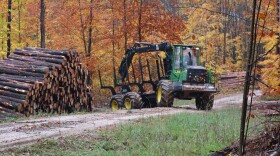A northern white cedar tree can grow to be 50 feet tall and in some cases, can live to be a thousand years old. A new policy in the Soo aims to ensure sustainable bark harvest.
The Sault Tribe of Chippewa Indians recently updated its code to prevent Giizhik or northern white cedar bark from over-harvesting.
Now, tribal members must obtain a permit before collecting bark from tribal or public lands. Harvests are limited to when wild strawberries are blooming, between June and September, to reduce stress on trees.
Robin Clark, a natural resources director with the tribe, said the policy is meant to ensure long-lived cedar trees can persist into the future.
"Northern white cedar is this iconic tree species endemic to North America, and it's crucial and absolutely essential in Anishinaabe and other indigenous communities' ways of life," Clark said.
The code also specifies which trees are eligible for harvesting and how bark can be gathered. Trees must at least 12" wide in diameter and may only be harvested once in their lifetime. Bark can only be collected in vertical strips that are narrower than the width of a hand and less than a fifth of the tree's circumference.
"[The policy] is for the tribe, but it's really meant to be modeling what we should all be, in terms of sustainable harvest," Clark said. "[We're] not just thinking about our kids, but we're thinking hundreds of years into the future because that's how long these trees live."
Read Clark's work on gathering Giizhik here.




